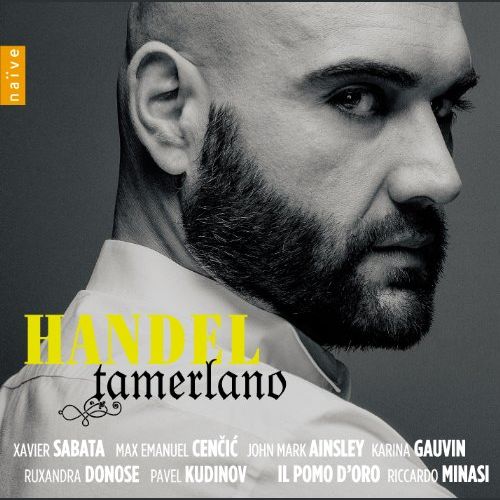
HANDEL: TAMERLANO
HANDEL
Tamerlano (Opera in 3 Acts)
Xavier Sabata CONTROTENORE Tamerlano
Max Emanuel Cencic CONTROTENORE Andronico
John Mark Ainsley TENORE Bajazet
Karina Gauvin SOPRANO Asteria
Ruxandra Donose MEZZOSOPRANO Irene
Pavel Kudinov BASS Leone
Il pomo d’oro,
Riccardo Minasi DIRETTORE d’ORCHESTRA
[…] The chief characteristic of this performance is the unbridled energy of the orchestra. Time and again, in fast music, the violins speed towards the end of a phrase like a bull charging a gate; further impetus comes from swelling on tied notes. Tamerlano’s first aria is marked by heavy accents, while the strings surge and stab away in Bajazet’s exciting ‘Ciel e terra’. It is immensely invigorating, but there are calmer episodes too: soft clarinets for Irene’s siciliano and gentle recorders for ‘Vivo in te’, a duet in the vein of ‘Io t’abbraccio’ in the following year’s Rodelinda.
John Mark Ainsley makes a heroic Bajazet, deeply moving in the broken phrases of his death scene; Andronico is tenderly sung by Max Emanuel Cencic; and Ruxandra Donose brings lovely warm tone to Irene. Why does she speak over the music in her arietta? Karina Gauvin is splendidly forthright as Asteria: no shrinking violet, she makes the singers for Trevor Pinnock and George Petrou sound bland in comparison. […]
Petrou’s account of the 1724 version, recitatives and all, is still to be prized. There are good things in Pinnock’s live recording (1731, roughly, minus four arias). But newcomers should start with this throat-grabbing performance from Riccardo Minasi and Il Pomo d’Oro.
Richard Lawrence – Gramophone
Under the direction of Riccardo Minasi, the twenty-one instrumentalists of Il pomo d’oro deliver a performance that reverberates with energy, excitement, and feeling. The playing of Maxim Emelyanychev at the harpsichord and Simone Vallerotonda on theorbo, archlute, and Baroque guitar shapes a continuo remarkable for its responsiveness to the dramatic heartbeats of Händel’s music. Vitality and momentum are maintained in secco recitatives, but Maestro Minasi and the players do not hesitate to linger over moments of greatest lyricism. The virtuosity of Il pomo d’oro’s playing is complemented by an inspiriting sense of involvement in the performance. The intimacy of the recorded sound contributes to the consciousness of a collaborative artistic experience rather than a conventional performance in which singers, orchestra, and conductor are separate entities. There is an inviolable unity of purpose that permeates every moment of this performance, and the eloquence of Maestro Minasi’s conducting and Il pomo d’oro’s playing, which want for nothing in period-appropriate stylishness but transcend inelastic adherence to dry academic concepts, fosters an environment in which Händel’s exacting vocal lines seem the only natural means of communicating. Employing a recreation of the edition of the score that Händel created for the revival of the opera in London in 1731, when Senesino reprised his portrayal of Andronico and was joined by Campioli in the title rôle, the celebrated Anna Maria Strada del Pò as Asteria, Giovanni Battista Pinacci as Bajazet, Francesca Bertolli as Irene, and Antonio Montagnana as Leone, this recording exudes a continuity lacking in many performances of Händel’s operas. Every delicacy of Tamerlano is embraced by Maestro Minasi, and the nuances of his approach are brought to life with sensitivity and tenderness by Il pomo d’oro.
Joseph Newsome – Voix des arts
Conductor Riccardo Minasi’s conducting is second to none, too, and the work’s severity and sensuousness are wonderfully captured by Il Pomo d’Oro. This is one of the great Handel recordings and very highly recommended.
Tim Ashley – The Guardian
‘The cast is of exceptional and even strength [and] Minasi’s experience as a violinist is evident throughout as he directs the period instruments ensemble Il Pomo d’Oro. The orchestral performance is dynamic, the bowing expressive.’
Anna Picard – BBC Music Magazine
Release Date : 31/03/2014
Label : naïve
